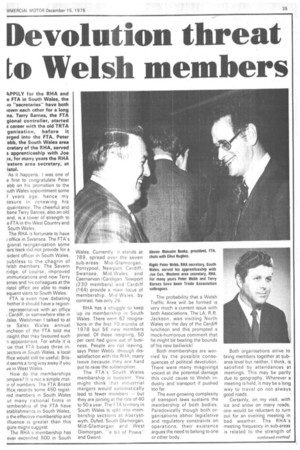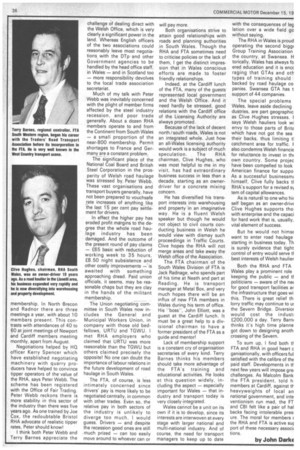Devolution threat to Welsh members
Page 37

Page 38

If you've noticed an error in this article please click here to report it so we can fix it.
kPPILY for the RNA and e FTA in South Wales, the ro "secretaries" have both 'own each other for a long ne. Terry Barnes, the FTA gional controller, started s career with the old TRTA .ganisation, before it srged into the FTA. Peter 'ebb, the South Wales area cretary of the RNA, served sL apprenticeship with Joe )x, for many years the RHA 'estern area secretary, at
As it happens, I was one of e first to congratulate Peter ebb on his promotion to the )uth Wales appointment some } years ago; hence my easure in renewing his quaintance. The cheerful and bane Terry Barnes, also an old end, is a tower of strength to e FTA in the West Country and South Wales.
The RHA is fortunate to have ,office in Swansea. The FTA's gional reorganisation some iars back did not provide for a sident officer in South Wales, Jubtless to the chagrin of felsh members_ The Severn ridge, of course, improved )mmunications and now Terry 3rnes and his colleagues at the ristol office are able to make equent visits to South Wales. FTA is even now debating hether it should have a regionrepresentative with an office L Cardiff, or somewhere else in /ales. Welshmen I talked to at le Sales Wales annual incheon of the FTA told me :raight that they favoured such 1 appointment_ For while it is ue that FTA bases three in3ectors in South Wales, a local ft ice would still be useful; Bris)I seems a long way away if you vein West Wales.
How do the memberships rn pa re? It is not a simple mat)r of numbers. The FTA Bristol ffice records some 450 registred members in South Wales ut many national firms in lembership of the FTA have stablishmerts in South Wales, a the effective membership and ifluence is greater than this gure might suggest.
The RHA's membership has ever exceeded BOO in South Wales. Currently, it stands at 789, spread over the seven sub-areas: Mid-Glamorgan, Pontypool, Newport, Cardiff, Swansea, Mid-Wales, and Caernarvon /Cardigan Newport (230 members) and Cardiff (164) provide a main focus of membership. Mid-Wales, by contrast, has only 26.
RHA has a struggle to keep up its membership in South Wales. There were 62 resignations in the first 10 months of 1978 but 56 new members joined. Of those resigning, 50 per cent had gone out of business. People are not leaving, says Peter Webb, through dissatisfaction with the RHA; many leave because they are hard put to raise the subscription.
The FTA's South Wales membership is buoyant. You might think that industrial mergers would automatically lead to fewer members — but they are joining at the rate of 40 to 50 a year. The FTA territory in South Wales is split into membership sections at Aberystwyth, Dyfed, South Glamorgan, Mid-Glamorgan and West Glamorgan, -a bit of Powis" and Gwent. The probability that a Welsh Traffic Area will be formed is very much a current issue with both Associations. The LA, R.R. Jackson, was visiting North Wales on the day of the Cardiff luncheon and this prompted a mock-humorous commer(t that he might be beating the bounds of his new bailiwick!
Both memberships are worried by the possible consequences of political devolution. There were many misgivings voiced at the potential damage this could cause to Welsh industry and transport if pushed too far.
The ever-growing complexity of transport laws sustains the membership of both bodies. Paradoxically though both organisations abhor legislative and regulatory constraints on operations, their existence argues the need to belong to one or other body. Both organisations strive to bring members together at subarea level but neither, I think, is satisfied by attendances at meetings. This may be partly due to geography. Wherever a meeting is held, it may be a long way to travel on not always good roads.
Certainly, on my visit, with ice and snow on many roads, one would be reluctant to turn out for an evening meeting in bad weather. The RHA's meeting frequency in sub-areas is related to the strength of membership. In North .Brecon and Radnor there are three meetings a year, with about 10 members present. This contrasts with attendances of 40 to 60 at joint meetings of Newport and Cardiff members meeting monthly, apart from August.
Negotiations helped by HQ officer Kerry Spencer which have established negotiating machinery with quarry producers have helped to convince tipper operators of the' value of the RHA, says Peter Webb. The scheme has been registered with the Office of Fair Trading. Peter Webb reckons there is more stability, in this sector of the industry than there was five years ago. As one trained by Joe Cox, the redoubtable Bristol RHA advocate of realistic tipper rates, Peter should know!
I think both Peter Webb and Terry Barnes appreciate the challenge of dealing direct with the Welsh Office, which is very clearly a significant power in the land. Whereas English officers of the two associations could reasonably leave most negotiations with the DTp and other Government agencies to be handled by the head office staff, in Wales — and in Scotland too — more responsibility devolves to the local trade association secretariat.
Much of my talk with Peter Webb was inevitably concerned with the plight of member firms affected by the steel industry recession, and poor trade generally. About a dozen RHA members operate to and from the Continent from South Wales — a small proportion of the near-800 membership. Permit shortages to France and Germany are a constant problem.
The significant place of the National Coal Board and British Steel Corporation in the prosperity of Welsh road haulage was stressed by Peter Webb. These vast organisations and transport buyers generally, have not been prepared to vouchsafe rate increases of anything _like the last 15 per cent pay settlement for drivers.
In effect the higher pay has eroded profit margins to the degree that the whole road haulage industry has been damaged. And the outcome of the present round of pay claims — £65 basic with reduction of working week to 35 hours, £8.50 night subsistence and other costly improvements is awaited with something approaching dread. Paid union officials, it seems, may be reasonable chaps but they are clay in the hands of the militant membership.
The Union negotiating committee in South Wales now includes the General and Municipal Workers Union, in company with those old bedfellows, URTU and TGWU. I met RHA employers who claimed that URTU was more reasonable than the TGWU but others claimed precisely the opposite! No one can doubt the importance of labour relations in the future development of road haulage in South Wales.
The FTA, of course, is less intimately concerned since drivers' pay is more likely to be negotiated centrally, in common with other trades. Even so, the relative pay in both sectors of the industry is unlikely to diverge too much, I would guess. Drivers — and despite the recession good ones are still . much prized — can too easily move around to whoever can or will pay more.
Both organisations strive to attain good relationships with roads and planning authorities in South Wales. Though the RHA and FTA sometimes need to criticise policies or the lack of them, I get the distinct impression that in Wales conscious efforts are made to foster friendly relationships.
Indeed, at the Cardiff lunch of the FTA, many of the guests represented local government and the Welsh Office. And it need hardly be stressed, good relations with the Cardiff office of the Licensing Authority are always promoted.
Because of the lack of decent north/south roads, Wales is not an integrated whole. Just how an all-Wales licensing authority would work is a subject of much speculation. The RHA chairman, Clive Hughes, who was most helpful to me in my visit, has had extraordinary business success in less than a decade, starting as an ownerdriver for a concrete mixing concern.
He has diversified his transport interests into warehousing and property in an imaginative way. He is a fluent Welsh speaker but though he would not object to civil courts conducting business in Welsh he would view with dismay such proceedings in Traffic Courts. Clive hopes the RHA will not merge areas and take away the Welsh office of the Association.
The FTA chairman of the South Wales Division of FTA is Jack Radnage, who spends part of his time at Neath and part at Reading. He is transport manager at Metal Box, and very much hopes there will be an influx of new FTA members in Wales during his term of office. His 'boss'', John Elliott, was a guest at the Cardiff lunch. It must be a great help to a divisional chairman to have a former president of the FTA as a guide and mentor!
Lack of membership support is a constant cry of organisation secretaries of every kind. Terry Barnes thinks his members should take more advantage of the ETA's training and educational activities. He looks at this question widely, including the aspect — especially important for Wales — that industry and transport today is very closely integrated.
Wales cannot be a unit on its own if it is to develop, since its interests are interwoven at every stage with larger national and multi-national industry. And of course, the need for transport managers to keep up to date with the consequences of leg lation over a wide field go without saying.
The RHA in Wales is proud operating the second biggi Group Training Association the country, at Swansea. H torically, Wales has always fo ered education and it is ence raging that GTAs and oth types of training should backed by road haulage co panies. Swansea GTA has t support of 44 companies.
The special problems Wales, leave aside declining dustries, are part geographic as Clive .Hughes stresses. I says Welsh hauliers look wi envy to those parts of Britz which have not got the sea their backs, thus limiting tl catchment area for traffic. I also condemns Welsh financiE for reluctance to invest in thi own country. Some projec have been compelled to look American finance for suppo As a successful businessme himself, Clive fully backs tl RHA's support for a revised m tern of capital allowances.
As is natural to one who hit self began as an owner-drive Clive Hughes supports thcr with enterprise and the capaci for hard work that is, usually, vital element of success.
But he would not himse want to enter road haulage starting in business today. Th is surely evidence that tight control of entry would serve tl best interests of Welsh haulier Both the RHA and FTA Wales play a prominent role keeping the public — and tt politicians — aware of the nee for good transport facilities am the infrastructure that goes wi this. There is great relief th lorry traffic may continue to it! the Severn Bridge. Diversior would cost the industl £200,000 a day. Terry Barn thinks it's high time planne got down to designing anoth crossing of the Severn.
To sum up, I find both tt FTA and RHA in good heart c ganisationally, with officers ful satisfied with the calibre of the paid staff. Developments in tf next few years will impose gre challenges. As Malcolm Bank the FTA president, told h members at Cardiff, against th heavyweights of local an national government, and inte ventionism run mad, the FT and CBI felt like a pair of hal backs facing intolerable pres' ure. The moral for members the RHA and ETA is active suj port of these necessary associi tions.
by John Darke
















































































































